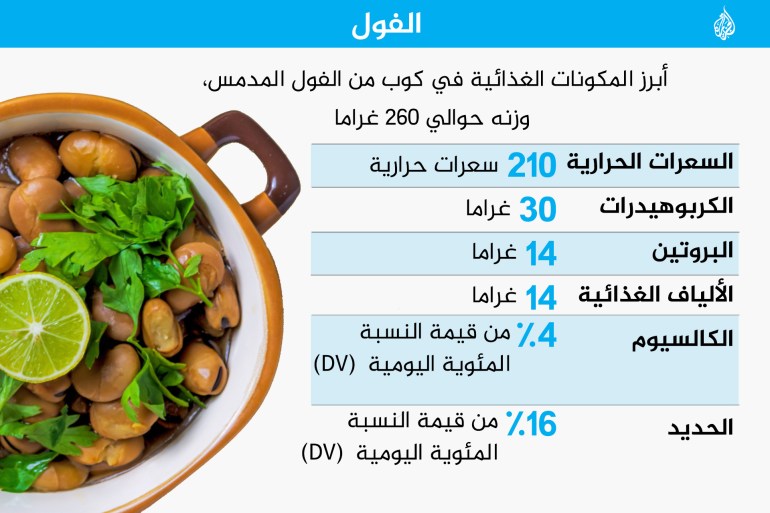Beans are one of the most popular and delicious dishes in the Arab world, so what happens to the body of a fasting person when he breaks his fast?
What are its effects on health?
We are talking here about dry beans that are soaked for hours and then cooked.
To begin with, we will get acquainted with the nutritional components that a cup of fava beans provides us with:
Dry beans are soaked in water for hours, and then boiled to prepare broad beans.
Dry beans are also used to prepare "ta'amiya", in which case they are not boiled after soaking, but rather are ground, kneaded, and then fried in hot oil.
What happens to the body of the fasting person when breaking the fast on beans?
Beans are a relatively heavy food. They are rich in dietary fiber, and tahini is added to it when preparing it, then oil is sprinkled on the dish after it is ready, and this means that it is rich in calories.
Therefore, if a fasting person eats beans for breakfast, he may feel heavy and tired, and also this depends on the quantity he eats and on the addition of oil and tahini to the dish.
For diabetics, it should be noted that beans are rich in carbohydrates, especially when eaten with bread, and therefore it must be calculated from the carbohydrate share so as not to lead to high blood sugar.
For cholesterol patients, try to reduce the amount of tahini that is added to it, because it is fat, and it is also preferable to eat it without oil or with olive oil.
As for high blood pressure patients, attention should be paid not to adding salt to it. As for canned beans, it is recommended to wash them from the soaking water before serving, because they are rich in sodium.
In conclusion, for patients with bowel disorders, beans may lead to trouble for them, so it is preferable to consult a doctor before eating it.
The following is recommended when eating beans in Ramadan:
Drink plenty of water, as the fiber in beans needs water to expand in the digestive tract and thus help you feel full.
Instead of eating a pickle that's high in salt and sodium with beans, eat tomatoes, cucumbers, and leafy greens like lettuce and onions, and you're getting plant-based nutrients, vitamins and extra fiber.
Some feel thirsty after eating beans, and for those, it may not be appropriate to eat it at Suhoor.
Reduce the salt on the beans to the maximum extent, it makes you feel thirsty, and doctors recommend reducing sodium in the food.
What are the most prominent benefits provided by eating fava beans?
Provide your body with plant proteins and folic acid.
Beans contain soluble dietary fiber that can aid in digestion and lower cholesterol levels.
According to studies, adequate levels of manganese and copper - two components found in beans - may enhance bone strength.
Beans are rich in iron, and may help treat anemia.
Fava beans may help you lose weight, and may be beneficial for your waistline, because it is rich in proteins and fibers, which help in feeling full and satiety, which may lead to reduced calorie intake and weight loss.
Beans may help lower cholesterol, as most of the fiber in them is soluble, which can bind to cholesterol and remove it from your body.
Beans provide the body with dietary fiber that helps a person feel full and stimulates bowel movements, thus helping to prevent constipation.

